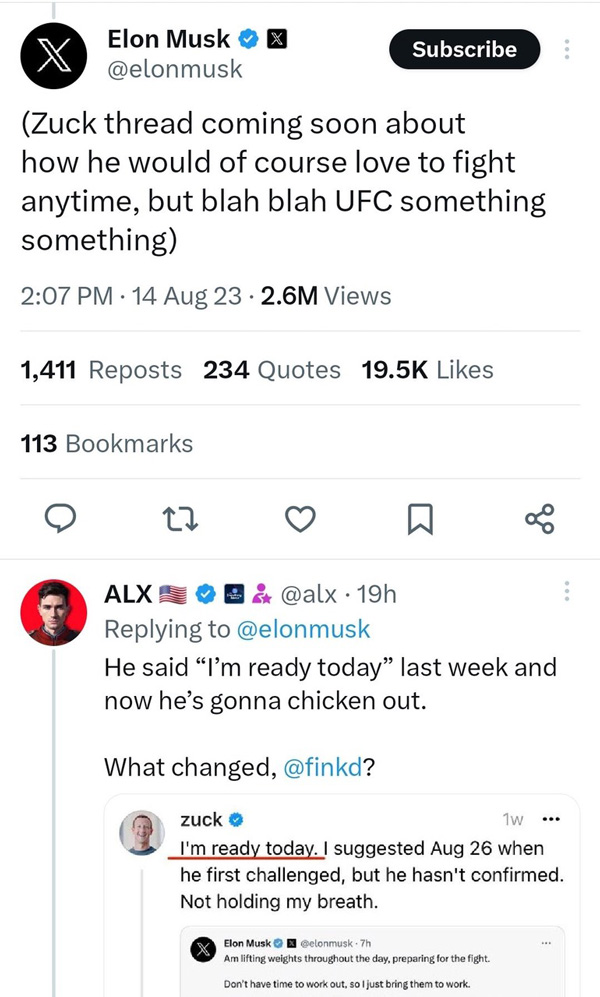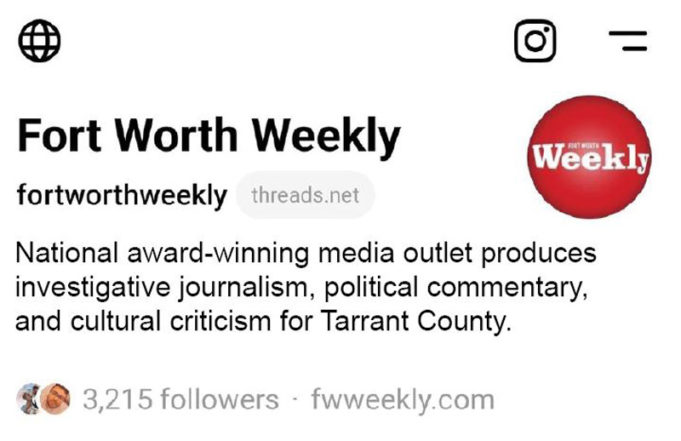Are you on Threads? Yes, you’re on Threads because you’re not a white supremacist POS. Now that we’re all there together, just know that not everyone’s fan.
“I deleted Threads after a couple of days of using it,” said singer-songwriter Jacob Furr. “It was useless to begin with, and I don’t think it wanted to be a real app. It’s just another example of the populace being pawns in the hands of billionaires’ spats. Fingers crossed the whole thing comes crashing down.”
The whole thing crashing down — doesn’t that sound nice? It sure does to us, a print-first publication. Maybe people will actually read stories again instead of just the headlines. (Spoiler alert: They never will again.) But social media, whether we love it or hate it, is an important tool in a functioning democracy in the internet age. As much as we’d love to, we Weekly folk wouldn’t be able to print the news fast enough to keep up with the rate of healthy information we’ve all become accustomed to. And social media, while not a panacea to society’s ills, has helped a lot of progressive causes, the smallest but perhaps most awesome of which has been the complete and utter destruction of whatever face Elon Musk may have once had.
The new owner of Twitter — sorry, X — can’t tweet a single thing without a billion non-Nazis making fun of him, which has to be completely demoralizing for a narcissist who craves public approval like a warm bottle and a changed diaper. From reigniting space exploration and offering efficient electric vehicles, the emerald mine heir has been exposed as the racist trash that he is. Good riddance, X.
Which brings us back to … Threads.
The app with the kind of low character count/fast scrolling that made Twitter popular is the latest blow to Musk’s ambitions to rule the world.
Both he and fellow billionaire Mark Zuckerberg (Facebook, Instagram) have exchanged virtual jabs. Zuckerberg has criticized the way Musk runs X, and Musk has called for a cage fight to settle the matter — totally just like an adult.

Courtesy X
Most alarming of Enron’s missteps over the past year has been the sharp rise in hate speech following his takeover. Apparently, Proud Boys, Trumptards, and other racist ass-hats were ready for all the freedumb that came with the billionaire’s “free speech absolutism.”
The Brookings Institution said that Twitter “saw a nearly 500% increase in use of the N-word in the 12-hour window immediately following the shift of ownership to Musk.”
In April, X reportedly removed a policy protecting queer users. Now gone are bans against the “targeted misgendering or deadnaming of transgender individuals.”
Sarah Kate Ellis with the LGBTQ advocacy nonprofit GLAAD said the billionaire loon’s decision is the latest example of how X is unsafe for the queer community.
“This decision to roll back LGBTQ safety puts [X] even more out of step with TikTok, Pinterest, and Meta,” the parent company of Facebook and Instagram, she said, “which all maintain similar policies to protect their transgender users at a time when anti-transgender rhetoric online is leading to real-world discrimination and violence.”
Rather than address the rampant right-wing hate speech on his platform, Musk threatened to sue the researchers tracking it. Narcissists tend to not take criticism well, even when the critiques are fact-based. In June, an X attorney wrote to the Center for Countering Digital Hate (CCDH), an anti-hate-minded group, threatening legal action in response to the nonprofit’s research. Without evidence, X alleged that CCDH published its research solely to discredit the platform.
“CCDH intends to harm Twitter’s business by driving advertisers away from the platform with incendiary claims,” X said.
The center’s CEO told the Associated Press that groups found complicit in inciting hate speech typically issue apologies and announce steps to reform their online platforms instead of try to sue to stop the publication of research.
Antisemitic tweets and pro-Trump posts also rose sharply since Elmo took over. In April, NPR became the first major news organization to drop its assorted Twitter accounts, and hundreds of celebs with yewg followings terminated their accounts due to concerns over Musk’s refusal to safeguard against bile. Author and women’s rights activist Amy Siskind dropped X soon after Peon Elon arrived.
“Whatever content I provide here goes directly towards enriching one man who I think is absolutely awful,” she posted on Facebook. “People need to understand that [Twitter] is no longer a public company. Every post you make here is free content to enrich one man, Elon Musk. He is completely in control and answers to no one. I don’t view him as a mentally stable person.”
Were Musk just another megalomaniac male in a pissing contest to feed his own over-the-counter-testosterone-driven ego, the masses would have less reason to worry, but in a time when an indicted former president remains one political party’s best shot at reclaiming the White House and when reproductive rights are still verboten in red states, the machinations of powerbrokers like Musk matter.
*****
As Musk’s fortunes imploded, a seemingly less malevolent billionaire pounced at the chance to put him down for the count.
Leapfrogging off the popularity of Instagram, which has more than 2 billion active users, Zuckerberg’s newest effort leverages his photo-sharing app to make joining Threads seamless and easy. The fastest-growing app ever scooped up 100 million users within the first five days of launching. Meta benefited from the confluence of a mass exodus from X plus Threads’ promise to protect against hate speech. The crossover in user base between the two apps is similar, but Threads’ skew younger due to Instagram’s popularity among 18- to 24-year-olds.
And most of them are brown and out, which must drive crusty crackers like Dodge Neon crazy.

Deposit Photos
Supporters of social media as a tool for good often point to the so-called “Twitter Revolutions” in Egypt and Tunisia a dozen years ago. The Guardian says not so fast, adding that the “contribution of social networks to the Arab uprisings has been as important as it also has been complex, contradictory, and misunderstood.”
Headlines like “Tunisia’s Twitter Revolution?” (The Atlantic) stand at odds with the number of active users at the time. Based on The Guardian’s reporting, pre-revolution Tunisia had around 200 active tweeters and around 2,000 registered accounts, meaning even that oft-heralded example of social media as an agent of change may be bogus.
Still, apps like Facebook play an important role in providing public forums for calling out tyrannical leaders. This makes the decision by the Tarrant County District Attorney to turn off comments on Twitter, Facebook, and Instagram so unsettling. Courts across the country have routinely ruled that comment sections are public forums and as such cannot be infringed upon. Doesn’t matter to DA Phil Sorrells and his cronies.
The man poised to “save” civilization from the insane owner of X is himself partly responsible for allowing a gameshow host to ride a wave of misinformation to office in 2016. Recent news of a fourth round of felony indictments against Con-ald — this one for his active meddling in Georgia’s 2020 ballot counting — would be reassuring were it not for the fact that we face the very real possibility of a sitting president running the most powerful nation in the world from prison. To thank for that absurd possibility, we have his idiot supporters and social media apps that make mega-bucks peddling misinformation.
A 2017 study by New York University and Stanford found social media directed more users to fake news sites than credible information sources leading up to the election. The propagandists received 40% of online traffic from Facebook, Twitter, and Instagram while reputable publications like The New York Times and others garnered a paltry 10% of online readers. Reporting by The Times and others found algorithms used by outlets like Facebook and Twitter are designed to promote fake news, which tends to grab more attention than, y’know, a president calmly, quietly kicking inflation’s tail, creating jobs, rebuilding the nation’s infrastructure, y’know, workaday president-y stuff.
Will Threads and its promise to be news- and presumably misinformation-free be less menacing to society? Possibly. But steps to make the online platform a safer space for public discourse likely stem more from a desire to lure followers into buying shit than to provide a less-malarky-saturated online experience. X is readily known as the most dangerous online app for women, who receive threats, come-ons, and unsolicited photos that should never be taken let alone sent, mostly from strangers, while Instagram remains a potent tool for reducing the self-esteem of teens and adolescents, who compare themselves to their peers and influencers/lingerie models who are perceived as representing and perpetuating traditional beauty ideals.

Courtesy AmySiskind.com
We are bombarded with more information than ever yet remain willfully misinformed about ideas and products that could materially improve the collective quality of life for all of us. Facebook, Twitter, and other social media apps that we Weekly staffers use on a daily basis are keenly engineered to keep our readers engaged (read: distracted) for the longest periods possible.
Singer-songwriter Sean Russell (Cut Throat Finches, The Nancys), like most musicians, uses social media to promote his bands’ shows and share music videos, but he is uneasy about the damage that technology has wreaked upon society.
“I believe that it is no coincidence that the rise of unlimited access to social media in the United States is walking hand in hand with an alarming rise in depression and anxiety prescriptions for psychiatric drugs,” he said. “The irony of categorizing these platforms as ‘social’ might be the second-greatest lie sold to Americans — second only to when corporations bribe our government for favors [under the guise] of ‘lobbying.’ ”
Without knowing Musk’s inner motives, Russell can see the billionaire as a disruptor.
Musk is “likely to weaken the entire social media influence that is gripping our country,” Russell added, “so I suppose my comment to Elon Musk would be to encourage him to burn the whole motherfucker down. Amen.”
The newest challenger to Musk at least offers an alternative to a less savory corporate overlord, said Lee Geurkink, editor for Madeworthy, a local publication geared toward parents.

“Musk is growing more and more unstable,” she said, adding that he is “going off the rails. What’s more unsettling than his Twitter/X hijinks is that over half the communication satellites in orbit right now are owned by SpaceX, a.k.a. Elon Musk.”
*****
If Zuckerberg and Musk are today’s most prominent proponents of social media as an enabler of freedom of thought, perhaps their most insightful critic predates the advent of virtual connectivity. Aldous Huxley warned of our species’ greatest frailty: distraction. In Brave New World Revisited (1958), he said that humans have a weakness for differentiating between knowledge and falsehood and an insatiable appetite for mass communications of any sort.
“In regard to propaganda, the early advocates of universal literacy and a free press envisaged only two possibilities: the propaganda might be true, or the propaganda might be false,” he wrote. “They did not foresee what in fact has happened, above all in our Western capitalist democracies — the development of a vast mass communications industry, concerned in the main neither with the true nor the false but with the unreal, the more or less totally irrelevant. In a word, they failed to take into account man’s almost infinite appetite for distractions.”
Oh, don’t forget to follow the Weekly on all major social media platforms — including Threads.
This column reflects the opinions of the editorial board and not the Fort Worth Weekly. To submit a column, please email Editor Anthony Mariani at Anthony@FWWeekly.com. He will gently edit it for clarity and concision.












